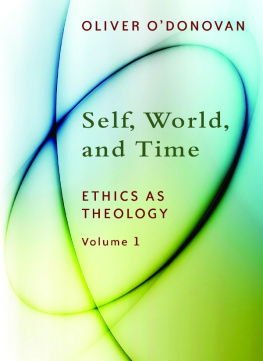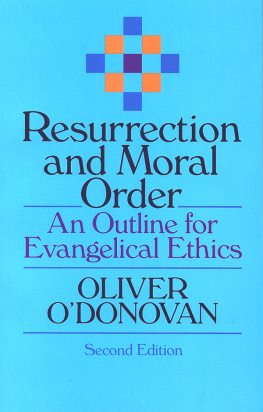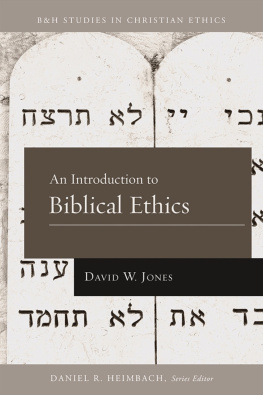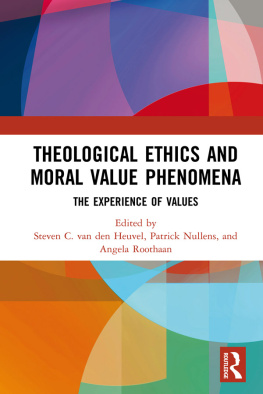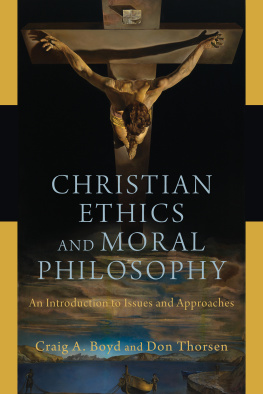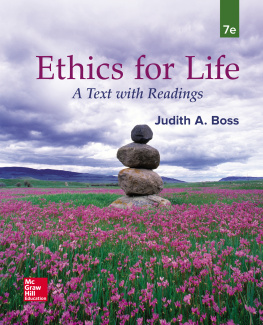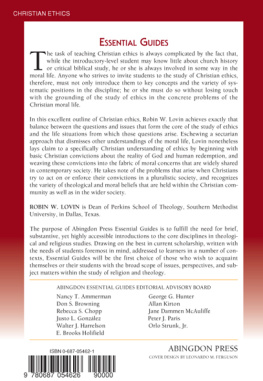
SELF, WORLD, AND TIME
Ethics as Theology 1
AN INDUCTION
Forthcoming:
FINDING AND SEEKING
Ethics as Theology 2
ENTERING INTO REST
Ethics as Theology 3
2013 Oliver ODonovan
All rights reserved
Published 2013 by
Wm. B. Eerdmans Publishing Co.
2140 Oak Industrial Drive N.E., Grand Rapids, Michigan 49505 /
P.O. Box 163, Cambridge CB3 9PU U.K.
Printed in the United States of America
19 18 17 16 15 14 13 7 6 5 4 3 2 1
Library of Congress Cataloging-in-Publication Data
ODonovan, Oliver.
Self, world, and time / Oliver ODonovan.
pages cm. (Ethics as theology 1 an induction)
Includes bibliographical references and index.
ISBN 978-1-4674-3755-4 (pbk.: alk. paper)
1. Christian ethics. I. Title.
BJ1251.O365 2013
241 dc23
2013005017
www.eerdmans.com
Contents
And is there room for yet another turn around the floor with that bad idea (as it has been called by a contemporary with a gift for a phrase), Christian Ethics? If Christian Ethics has proved a bad idea, it must be in part because it has been too much the playground of good ideas. Fresh starts, new methods, programs for reconfiguration, new special foci, chase one another bewilderingly through the issues of its journals and the proceedings of its conferences like the unveiling of the years new cars at the annual auto show, though with less sense of familiarity. Twenty years ago Johannes Fischer complained that in Protestant circles, at least, Theological Ethics has seemed in danger of disintegrating in a series of arbitrary new initiatives.
The Christian philosophy is said to be simple. Though it includes some teasing niceties about God, the sum of which preoccupation is a fairly uncontroversial claim of a creative cause sovereign, original, and source of all that is the greater part of its attention is given to moral instruction. Leaving to ethicists such harder questions as the nature of virtue and moral reason, the relation of morality to the passions and so on, its teachers ply the highways of edification, not proposing detailed guidance for acquiring each virtue in particular, but heaping one general exhortation on another unsystematically. To this the masses respond well, one may see, by growing more civilized and by imprinting their common morality with a stamp of piety, so that starting from the morality of custom thus fanned into flame there develops by small increments an appetite for the Good in its own right. Yet as their debates became more and more polarized over the years, more people became involved in contentious wrangling, which led to the emergence of those whom one might describe as the more energetic and argumentative at the head of rival schools. This compromised the hidden genius of their morality. As the prominent champions of the schools argued without precision, as the masses became ever more disturbed about the questions, as there was no standard and no norm for resolving the controversies, competitiveness took over, as so often happens, and left everything a total mess.
Too much a creature of fashion to be trustworthy as a science, too much a creature of ideas to be pastorally helpful to the church, too soft for the university, too abstract for the theological seminary, Christian Ethics finds itself a despised outcast in the world, always hunting round for protective alliances. When I began my studies forty years ago, it seemed that Moral Philosophy of the analytic school would be its tutelary genius. The Euthyphro dilemma would determine the scope of its appeal to authority; attention to deductive logic would help it clean up its language. Today the struggle for its soul is fought out between the statistical columns of the social sciences and a dogmatic theology newly confident on Trinitarian or sacramental foundations. Absorbed on one side into the theological construction of reality, propelled on the other into the bureaucratic mapping of contemporary history, Christian Ethics is condemned, it would seem, to surrender gracefully to one or another imperial organization of reality, if it is not to defend a point that turns out to have no dimensions.
And yet we remember what Voltaire said of God: si Dieu nexistait pas.... The dimensionless point on which Christian Ethics sits is not a chimera. It is shared with the reasons and discourses of moral thought and moral teaching. Dimensionless, because it is a tipping-point, the moment at which reason becomes action, and of the solid realities that crowd it in on every side there are questions to be asked and answered that could not be posed from any other point than that. Practical reason cannot be projected onto the world-map of the scientific empires. Its outsider character speaks of its proximity to existence, to the questions people ask for themselves before they have been to college to learn what questions they ought to ask. There will have to be a Christian Ethics for as long as people ask what they are to do, how they are to live their lives, how their doing and their living may bring them closer to God or put them further from him. Their questions are not ideas, and they are not posed from any discipline. Ideas and disciplines are simply attempts to get grappling irons on them. The questions assert themselves, and keep on coming back when they seemed to be settled. Those who ask them will not be satisfied with being told that they are non-questions. The only point to be resolved is whether any help will be had with them from the faculties of learning in church or university if (and it is a big if) such faculties survive in either church or university. Shall the thoughtful be strengthened by a community of reflection? Or shall their questions be faced each time in ignorance that they have ever been faced before?
In case this line of defense should seem to be a rather complacent way of shielding a disorderly enterprise, let me add that there is much that those who pursue the discipline of Ethics can do to make good the promise of ordered intellectual help. Perhaps I may offer a pointer or two, in usumperitiorum, for those who will practice this discipline with me and after me. It may also serve as an apology for whatever may strike an unprepared reader of this book as merely idiosyncratic.
First, they must enter into the lived experience of practical deliberation for themselves, and inhabit it as residents, not as those visiting on occasional research trips. For myself, I now see that I embarked on Christian Ethics as I embarked on life and faith themselves, by being catapulted into it. It was a simple demand of existence that I should ask two questions: what I was put on earth to do, and what it could mean that I was put on earth to do it. Some will reproach me that if I had accepted a plain and straightforward answer to the first of these questions, I need never have bothered so much with the second. I would simply have got up from my desk and gone forth, like the early disciples, to preach the Gospel, feed the hungry, and heal the sick. Perhaps there is some truth in the reproach. I admire those who, once given their task, gird up their loins and go their way, saluting no one on the road. But stern activism is more attractive as a charism than as a universal prescription. Once the larger questions have presented themselves, they, too, impose a task which allows of no refusal. They, too, are the travail that God has given to the sons of man to be exercised therewith (Eccles. 1:13).
Secondly, since Ethics is necessarily an architectural enterprise, bringing trains of thought together which have different inner logics, the practitioner must be able to function polymorphously, now telling a narrative, now mounting an argument that proceeds to valid inference, now depicting reality adequately from many sides. There is always a temptation to play Ethics as rugby is played: eying up the shortest route, putting the head down, shoving as hard as possible. We would do better to remember the old wisdom that every science must save the appearances. The Ethics we inherit is something to make sense of, however critical our perspective on it. As a branch of theology it is not only speculative but also hermeneutic; it has its texts canonical, traditional, and critical and must attend to them. It may never say, I have no need of that hypothesis! not, at least, until it has understood what need others have had for it, ensuring that none of its serviceability is lost. There is a scholarly task of careful and judicious remembering; Ethics no less than doctrine needs its
Next page
